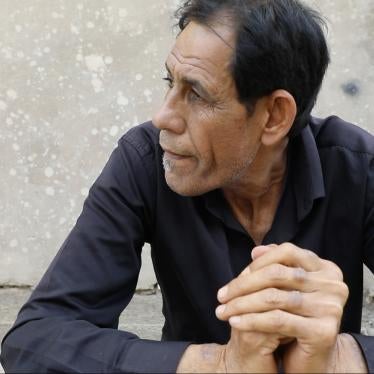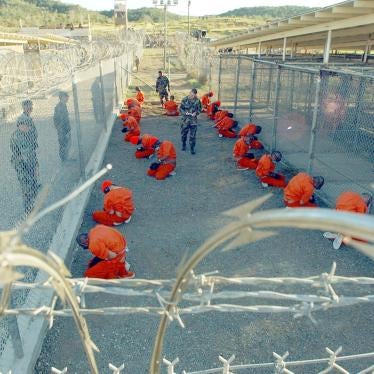The U.S. detention center at Guantanamo Bay, Cuba, should be closed. Its continued existence is unfair to the individuals held there, and of negative benefit to the United States.
Why exactly should it be closed? Here are four good reasons.
First, Guantanamo is a symbol of lawlessness. It was chosen as a detention site because it is located offshore, on foreign territory, and the Bush Administration therefore believed it was safely beyond the jurisdiction of any court. It was, as a British court pointed out in a 2002 decision, a "legal black hole."
Second, detainees at Guantanamo have been arbitrarily detained, physically abused, and even tortured. They have spent years without any fair legal process, held on the basis of secret evidence.
Third, Guantanamo has harmed the fight against terrorism. It has undermined international cooperation and alienated Muslim communities. And fourth, the moral authority of the United States has been severely compromised by Guantanamo's existence, with disastrous results for the U.S. government's ability to promote human rights abroad.
Four and a Half Years of Detention Without Charge
We'll start by briefly reviewing the facts. The first detainees were brought to Guantanamo on January 11, 2002, more than four and a half years ago. Since then, none of the roughly 775 detainees who have been held there has ever seen a judge. For the first two-and-a half years that detainees were held on Guantanamo, none of them were even allowed to see lawyers. Because the Bush Administration has deemed them unlawful enemy combatants, it has claimed the right to hold them without charge until the "war on terror" ends.
From the information that is known, it appears that only a minority of the detainees were captured on the battlefield in Afghanistan. Many detainees were picked up in Pakistan, often being sold to American troops for a bounty; others were arrested in countries ranging from Bosnia to Indonesia to Egypt.
Since Guantanamo opened, 38 detainees have been declared "no longer enemy combatants" -- a status that's the official equivalent of "oops" -- and hundreds more have been returned home because the U.S. had decided they were no longer a threat. The vast majority of these ex-detainees are now free, even though the U.S. has put pressure on many of their home countries to detain them.
A few detainees have sought a different way of escaping Guantanamo. Three detainees committed suicide this year; dozens more have tried to. Hunger strikes are common.
A Legal Black Hole
Even were one to believe that the Guantanamo detainees have been correctly deemed enemy combatants, there's no good reason to keep them in Cuba.
During World War II, the United States held hundreds of thousands of German and Italian POWs on U.S. territory -- in Texas, Arizona, and elsewhere. At present, we have more than two million prisoners in U.S. prisons and jails, including a number of convicted terrorists. It is obvious we could have easily incarcerated a few hundred more on U.S. soil.
So why the choice of Guantanamo? Guantanamo was attractive as a place of detention for one reason alone: it was thought to be a legal black hole. More specifically, because of a series of court rulings in the 1990s involving Haitian and Cuban refugees, Guantanamo was believed to be beyond the reach of the Constitution and the courts.
The Supreme Court's 2004 decision in Rasul v. Bush, which held that the courts had habeas corpus jurisdiction over Guantanamo, changed this picture dramatically. Detainees got access to counsel, and information about Guantanamo began to reach the public.
The impact of Rasul has been put into question, however, by the jurisdiction-stripping provisions of the Detainee Treatment Act of 2005 and the Military Commissions Act of 2006. Whether the courts will continue to monitor abuses at Guantanamo may hinge on a constitutional challenge.
Arbitrary Detention and Abuse
Detainees at Guantanamo have been subject to arbitrary detention. The combatant status review tribunals that are supposed to assess whether the detainees are enemy combatants base their decisions on secret evidence that the detainees have no opportunity to confront. The decision-making process is quick, efficient, and nearly worthless in terms of reaching a reliable result.
Moreover, the U.S. war with Afghanistan is long over, and thus the only legitimate justification for these men's detention is gone. As of June 19, 2002, when Hamid Karzai was elected to the presidency of Afghanistan, the international armed conflict in that country was at an end. Detainees from that conflict should either be tried for war crimes or other criminal offenses, if there's evidence against them, or they should be returned to Afghanistan.
With arbitrary detention, has come physical abuse. The President said in his February 7, 2002, Executive Order that the detainees at Guantanamo should be treated in accordance with the Geneva Conventions, "to the extent appropriate and consistent with military necessity." In adding this caveat to the rule of humane treatment, he opened the door to a whole series of abuses.
Ex-detainees have reported beatings and cruel treatment, but it may be that the worst abuses at Guantanamo were endured by a prisoner who remains detained. Muhammed al-Qahtani, a Saudi citizen who is alleged to have been implicated in the September 11 plot, was physically and mentally mistreated from mid-November 2002 to early January 2003. For six weeks, he was intentionally deprived of sleep, put into painful stress positions, forced to stand for long periods, and subject to sexual and other physical humiliation. He was refused trips to a latrine, so that he urinated on himself at least twice. He was also threatened with forced enemas, and on one occasion was subjected to one.
Human Rights Watch has obtained an unredacted copy of al-Qahtani's interrogation log, and believes that the techniques used during al-Qahtani's interrogation were so abusive that they amounted to torture.
Weakening the Counterterrorism Effort and Undermining U.S. Leadership on Human Rights
Another reason to close Guantanamo is that abuses committed in the name of counterterrorism have aggravated the terrorist threat. International counterterrorism cooperation has weakened, as courts in places as varied as Spain, France and Kuwait have condemned Guantanamo and refused to accept information obtained there. Worse, the use of torture and arbitrary detention against Muslim detainees has alienated Muslim communities whose good will and cooperation is needed, both in reporting suspicious activity and in bolstering shared norms against terrorism.
A final reason to oppose Guantanamo is that its existence has severely weakened the U.S. government's moral standing, and therefore its ability to press for human rights improvements abroad. Worse, abusive governments now claim that Guantanamo gives them license to engage in similar practices.
A $125 Million Mistake
The good news is that the detainee population at Guantanamo has been steadily shrinking since late 2004. There are currently 430 detainees at Guantanamo, and over 100 more are slated for release.
The bad news, however, is that Guantanamo shows little sign of readying for closure. Right now, in fact, it's expanding. The U.S. military announced last week that it plans to spend $125 million to build a new compound at Guantanamo, including a new high-security detention facility.
Congress, which will soon be debating legislative proposals to correct the worst aspects of the Military Commissions Act, should also consider ways of blocking this unnecessary new mistake.








